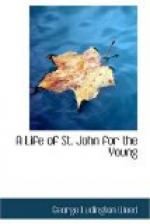But the disciple within could not forget the one without. They must not be separated in their common sorrow. Peter too must show by his presence his continued love for his Master. He must have opportunity to show in the palace something of the faithfulness of which he had boasted in the Upper Room, though it had faltered in Gethsemane.
“Then went out that other disciple which was known unto the high priest and spake unto her that kept the door, and brought in Peter.” That doorkeeper was not Rhoda—she who with a different spirit joyfully answered Peter’s knocking at another door—but was a pert maiden who, sympathizing with the enemies of Jesus, “saith unto Peter, Art thou also one of this man’s disciples?” She understood that John was such. Her contempt was aimed at them both. But it was not her question so much as Peter’s answer—“I am not”—that startled John. Was it for this denial that he had gained admission for his friend? It would have been better far if Peter had been kept “standing at the door without” though “it was cold,” than to be brought into the court of temptation and sin, where he “sat with the servants” in his curiosity “to see the end,” warming himself at the fire they had kindled.
Meanwhile we think of John hastening back to the judgment hall, from which he anxiously watched the movements of Peter “walking in the counsel of the ungodly, and standing in the way of sinners, and sitting in the seat of the scornful.”
Poor Peter! He fears to look into any man’s face, or to have any one look into his. He has obeyed the Master’s bidding, “Put up thy sword into the sheath,” but Malchus has not forgotten it; nor has his kinsman who saw Peter in the garden with Jesus,—though he may have forgotten the healing of Malchus’ ear by his prisoner.
Three Evangelists tell how Peter “sat” with the enemies of Jesus. John tells how at different times he “stood” among them. Thus does he report as an eye-witness, and show his own watchfulness of Peter’s restlessness;—of the conflicting emotions of shame and fear, the scornful frown, the enforced and deceiving smile, the defiant look, the vain effort to appear indifferent, and the storm of anger. Amazed at the first denial, shocked at the second, horrified at the third, what were John’s feelings when one was “with an oath,” and with another “he began to curse and to swear.” But concerning this climax of Peter’s sin, John is silent. It finds no place in his story.
At last “the Lord turned and looked upon Peter,” either from the hall, or as He was being led from it. At the same moment, Peter turned and looked upon Him. We imagine John turning and looking upon them both, marking the grief of the one, and the sense of guilt and shame of the other. But he knew the loving, though erring disciple so well that he need not be told that when “Peter went out” “he wept bitterly.” We almost see John himself weeping bitterly over his friend’s fall; then comforting him when they met again, with assurances of the Lord’s love and forgiveness. John’s next record of their being together shows them united in feeling, purpose and action for their Lord.




